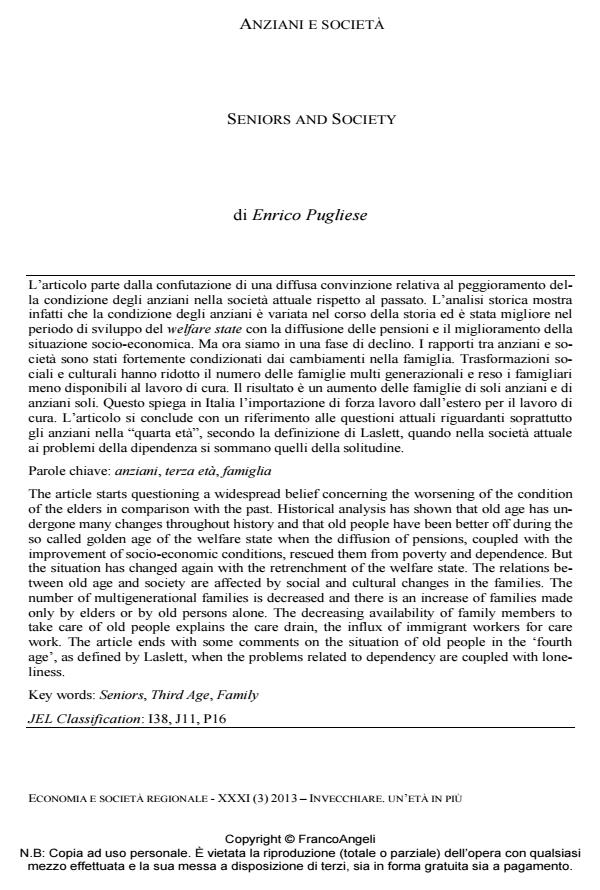Seniors and society
Journal title ECONOMIA E SOCIETÀ REGIONALE
Author/s Enrico Pugliese
Publishing Year 2014 Issue 2013/3
Language Italian Pages 13 P. 19-31 File size 711 KB
DOI 10.3280/ES2013-003003
DOI is like a bar code for intellectual property: to have more infomation
click here
Below, you can see the article first page
If you want to buy this article in PDF format, you can do it, following the instructions to buy download credits

FrancoAngeli is member of Publishers International Linking Association, Inc (PILA), a not-for-profit association which run the CrossRef service enabling links to and from online scholarly content.
The article starts questioning a widespread belief concerning the worsening of the condition of the elders in comparison with the past. Historical analysis has shown that old age has undergone many changes throughout history and that old people have been better off during the so called golden age of the welfare state when the diffusion of pensions, coupled with the improvement of socio-economic conditions, rescued them from poverty and dependence. But the situation has changed again with the retrenchment of the welfare state. The relations between old age and society are affected by social and cultural changes in the families. The number of multigenerational families is decreased and there is an increase of families made only by elders or by old persons alone. The decreasing availability of family members to take care of old people explains the care drain, the influx of immigrant workers for care work. The article ends with some comments on the situation of old people in the „fourth age‟, as defined by Laslett, when the problems related to dependency are coupled with loneliness.
Keywords: Seniors, Third Age, Family
Jel codes: I38, J11, P16
- Bourdelais P. (1993). L’age de la veillesse. Paris: Odile Jacob.
- Gee E. e Gutman G (2000). The Overselling of Population Ageing. Oxford: Oxford University Press.
- Guillemard A.M. (2003). L’age de l’emploi. Paris: Puf.
- Graebner W. (1984). Il pensionamento e le origini della discriminazione in base all’età. In: Gori D., a cura di. Vecchiaia e società. Bologna: il Mulino.
- Gramiccia R. (2012). La strage degli innocenti. Roma: Ediesse.
- Henrard J.C. (2002). Les défis du vieillissement. Paris: La Découverte.
- Johnson P.(1998). Old Age in History: From Antiquity to Postmodernity. London-New York: Routledge.
- Laslett P. (1989). A Fresh Map of Life. London: Weidenfeld and Nicholson. Trad. it. (1992). Una nuova mappa della vita. Bologna: il Mulino.
- Maccheroni C. (2009). Una stima della speranza di vita per grado di istruzione in Italia all’inizio degli anni 2000. Polis, 23.
- Pugliese E. (2011). La terza età. Anziani e società in Italia. Bologna: il Mulino.
- Walker A. (2001). UK: lavoratori anziani e occupazione: verso un invecchiamento attivo? L’assistenza sociale, 1-2.
- Walker A. (2005). Impatto sociale ed economico dell’invecchiamento. “Intervento all’omonimo convegno Spi-Cgil”. Roma, 20-21 giugno.
- Italian retirement migration: Stories from Bulgaria Monica Iorio, in Geoforum /2020 pp.198
DOI: 10.1016/j.geoforum.2020.02.018
Enrico Pugliese, Anziani e società in "ECONOMIA E SOCIETÀ REGIONALE " 3/2013, pp 19-31, DOI: 10.3280/ES2013-003003